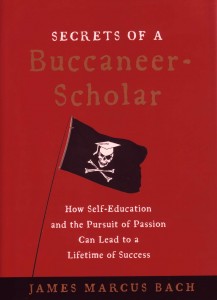By Marylene Delbourg-Delphis (@mddelphis)
 Andy Hertzfeld has recounted the story of the black flag at the center of which Susan Kare had painted a big skull and crossbones in white that was floating over Bandley 3 in 1983 until early 1984. Yes, for the Macintosh team “it was better to be a pirate than join the navy.” In the early nineties, black pirate flags were still hanging here and there around the Borland campus, the company created by Philippe Kahn (a phenomenal sailor himself). These are two of the companies where James Bach, the author of Secrets of a Buccaner-Scholar (subtitled “How Self-Education and the Pursuit of Passion Can Lead to a Lifetime of Success”) started a career that made him one of the most established “gurus” in software testing.
Andy Hertzfeld has recounted the story of the black flag at the center of which Susan Kare had painted a big skull and crossbones in white that was floating over Bandley 3 in 1983 until early 1984. Yes, for the Macintosh team “it was better to be a pirate than join the navy.” In the early nineties, black pirate flags were still hanging here and there around the Borland campus, the company created by Philippe Kahn (a phenomenal sailor himself). These are two of the companies where James Bach, the author of Secrets of a Buccaner-Scholar (subtitled “How Self-Education and the Pursuit of Passion Can Lead to a Lifetime of Success”) started a career that made him one of the most established “gurus” in software testing.
This book is the personal and intellectual autobiography of a high-school dropout. Thirty years later, James relives his allergy as a kid to “schoolism,” i.e. “the belief that schooling is the necessary and exclusive way to get a good education.” He educated himself differently, at his pace, of his own volition, rejecting indoctrination and institutional frameworks, but at the same pursuing his passion for discovery to the fullest – and often ending up working much harder than any person with a “normal” education. He was (and still is) an explorer, venturing into the world of knowledge as boldly and free-spiritedly as the privateers and corsairs of the seventeenth century. He is a buccaneer-scholar, i.e. a person whose “mental windsurfing” capabilities make him/her want to live a purpose-driven existence, build up a talent, and create a reputation – a reputation based on facts and achievements, not on degrees or any form of social entitlement.
This book is remarkable for two main reasons:
A clear analysis of what dropouts are about: Regardless of the reasons why kids happen to drop out, look at dropouts as people who first and foremost need to feel self-reliant as well as leverage their uniqueness and their independence in their own way. Don’t judge them. The best thing to do is to accompany them on their own road, mentor them smoothly and non-dogmatically as they identify opportunities that work for them. As James Bach recounts very well through his own history, dropouts are not anti-social. They simply hate precepts and authority: “the independence of buccaneering is independence from authority, not from humanity.” As a result, buccaneers welcome ideas and are thrilled to feel needed. Look, James loved the Apple II that his father gave him and made the best out of it – again at his own pace and in his own way. It’s true that “life is less convenient for those who chart their own course,” but trying to speed up or thwart that course can only make their lives harder. So help kindly! That’s what mentoring is about.
Guidelines for all people who want to reconstruct their own creativity: As autobiographical as this book is, James Bach doesn’t come across as self-absorbed. What’s clear is that James Bach does not despise people with degrees who were well-adjusted students, and instead contemplates the possibility that they might become buccaneers at some point in their lives, and want to rekindle a long-time buried “unstoppable curiosity.” Then all the schemas that implicitly or explicitly governed James’ life – ranging from the principle of peripheral wisdom, creative procrastination where ideas mature as a background task, to obsessive scouting, or heuristic questioning – are potential rudders for anyone. You may want to see this book as a set of tools for the reconstructive introspection that will make you get into the “next big thing.” Yes, “new industries are perfect for a buccaneering mind,” and in turn, you may want to become a buccaneering mind to estrange yourself from what you know all too well and experience the naive jubilation of newness.
This book is one of the best books I have read recently around the themes of self-motivation and creativity. Definitely the most heartfelt. Thanks to David Arscott to handing it to me the other day as we had breakfast at Coupa Cafe!

0 responses so far ↓
There are no comments yet...Kick things off by filling out the form below.
Leave a Comment